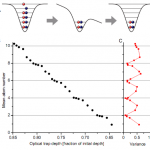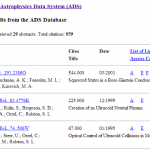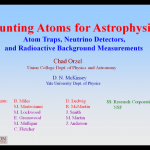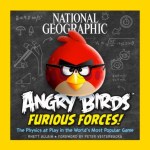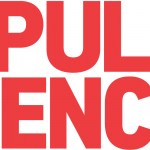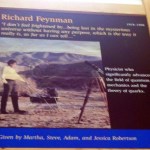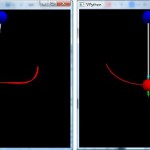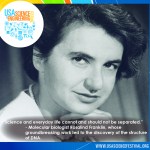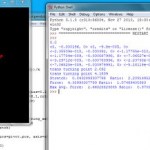Science
Hey, dude? Yeah, what's up?
I'm not normally the one who initiates this, but I was wondering: When you were at DAMOP last week, did you see any really neat physics? Oh, sure, tons of stuff. It was a little thinner than some past meetings-- a lot of the Usual Suspects didn't make the trip-- but there were some really good reports from a lot of groups.
Anything really surprising? Well, there was one talk that I really liked a lot, that I went to on a lark, because I didn't understand what the session title could possibly mean, and there was no abstract for the talk: Experimental Studies of…
I saw a bunch of people yesterday tweeting approval of John Hawks's complaint about academic timidity when it comes to blogging:
The bottom line is: People need to decide if they want to be heard, or if they want to be validated. I have long been an associate editor at PLoS ONE, and once I edited a paper that received a lot of critical commentary. That journal has a policy of open comment threads on papers, so I told disgruntled scientists to please write comments. The comments appear right with the article when anybody reads it, they appear immediately without any delay, and they can form a…
As previously noted, I spent most of last week at the 2013 DAMOP meeting, where I listened to a whole bunch of talks. At some point, I was listening to a talk, and said "I bet this guy hasn't given a lot of these before." What was the give-away? The fact that he almost never said "Um."
To the dismay of many students entering science majors, public speaking is a very significant part of being a professional scientist. Scientists are expected to give talks of a variety of different lengths-- 10-15 minute "contributed" talks at big meetings, 25-30 minute "invited" conference talks, 45-60 minute…
"From my close observation of writers... they fall into two groups: one, those who bleed copiously and visibly at any bad review, and two, those who bleed copiously and secretly at any bad review." -Isaac Asimov
You'd never know it unless you were one of about six people in the entire world, but today is a landmark anniversary for me. Three years ago, I was on summer break from teaching at my local college, when I got an email from the Royal Astronomical Society in England.
Image credit: Royal Astronomical Society, R102/0155 Herschel's Great Telescope.
The UK-based society at the forefront…
A little while back, I posted about the pro-theorist bias in popular physics, and Ashutosh Jogalekar offers a long and detailed response, which of course was posted on a day when I spent six hours driving to Quebec City for a conference. Sigh.
Happily, ZapperZ and Tom at Swans On Tea offer more or less the response I would've if I'd had time and Internet connectivity. Tom in particular gives a very thorough exploration of some of the reasons why experiment gets downplayed in popular physics. I particularly liked this bit:
I’m going to put forth a possibility: maybe we have a harder job, in…
Rhett at Dot Physics departed ScienceBlogs before NAtional Geographic fully took over, but still managed to connect with their book division for a physics text. This is part of a series they're doing tied in with the folks from Rovio, makers of the world's most popular smart-phone time-waster, and, as the title suggests, it uses Angry Birds as a jumping-off point to talk about physics. Rhett was, of course, an obvious choice for this, given the amount of time he's spent doing video analysis of Angry Birds to extract the underlying physics.
This is a book that can't really be reviewed just as…
I mentioned on Twitter that I was thinking of proposing a Science Online program item about the professionalization of blogging, throwing in a link to post from a couple months ago. That included a link to this SlideShare:
Talking to My Dog About Science: Why Public Communication of Science Matters and How Social Media Can Help from Chad Orzel
And that was re-tweeted by Chris Chabris, kicking off a gigantic conversation about the whole idea of scientists communicating directly with the public (most of which took place after I went to bed last night, so I only saw it in my Twitter…
Popular Science, one of the leading sources of news in technology, science, gadgets, space, green tech and more, is returning as a key Americium Media Partner with the Festival!
In doing so, Popular Science joins a growing list of other top science media leaders who will be serving as Festival sponsors, including Scientific American, American Scientist, Sigma Xi, ENGINEERING.com, Forbes Wolfe, and PBS Kids, among many others.
Popular Science has been a major source of science and technology news since its award-winning magazine was founded back in 1872. Its online version,…
While we're revisiting blog topics of the recent past, another item from this weekend's visit to the Ithaca Sciencenter, in the form of the picture above. For those with images off, or who read via RSS and won't see the picture, it's a photo of one of the inspirational plaques they have lining the walls of their community room, honoring famous scientists. This particular one is for Richard Feynman, and what struck me about it was that the photo isn't his Nobel Prize portrait, or him playing the bongos, but a somewhat grainy picture of him standing next to a telescope in the desert, pushing a…
Last week's post about communications between scientists and journalists sparked a bit of discussion, and prompted the folks at the IoP's Physics Focus blog to ask me for a guest post advising journalists on how to talk to scientists. The post is now live, with the self-explanatory headline How Journalists Can Help the Scientists They Interview:
The temptation for each party in this situation is to try to push as much of the work to the other as possible, and that’s where most advice from journalists to scientists (or vice versa) fails. Each side treats the conventions of their particular…
Over the next 10 years, what research done on bodies within our Solar System (measurements and theory) will be most important for informing our search for life beyond the Earth?
This is the current topic posed as the Single Question on the Future of Astrobiology at the ongoing NASA Astrobiology Institute Roadmap online exercise.
If you want to opine, The Forum is Open
Last week, I spent a bunch of time using VPython to simulate a simple pendulum, which was a fun way to fritter away several hours (yes, I'm a great big nerd), and led to some fun physics. I had a little more time to kill, so I did one of the things I mentioned as a possible follow-on, which turned out to be kind of baffling, in a good way.
Last week's post was written very quickly, and thus ended up a little more jargon-y than I usually shoot for, so let me try to set the stage a little better for this one. the physical system I'm talking about is just a simple pendulum, a mass on the end of…
Chalk one up for the forces of anti-science, quackery, and pseudoscience. The citizens of Portland, Oregon just handed them a huge victory the other day when they once again rejected water fluoridation in a referendum:
Fluoride supporters, it appeared, had everything going for them.
Five Portland city commissioners had voted to add fluoride to the city water supply. Health advocacy groups, and many of the city's communities of color, lined up behind the cause. And proponents outraised opponents 3-to-1.
But none of that was enough. For the fourth time since 1956, Portlanders on Tuesday night…
Over at National Geographic's other blog network, Ed Yong offers a guide for scientists talking to journalists. Like everything Ed writes about scientists and journalists, this was immediately re-tweeted by 5000 people calling it a must-read. Also like nearly everything Ed writes about scientists and journalists, some of it kind of rubbed me the wrong way.
Given our respective areas of interest, there's approximately zero chance that Ed will ever contact me to ask my opinion of a paper, but I want to push back on a few of these, anyway. Because, in the end, scientists aren't responding in…
At Scientific American's blog network, Ashutosh Jogalekar muses about the "greatest American physicist", eventually voting for Josiah Willard Gibbs, one of the pioneers of statistical mechanics. As both times I took StatMech (as an undergrad and in grad school), it was at 8:30 in the morning, I retain almost no memory of the subject, and will bow to greater experience in assessing Gibbs's importance.
I do, however, want to take issue with one thing in the post. When assessing the historical place of American physics, he writes:
Here’s my personal list for the title of greatest American…
The final session in the online discussion of the NASA Astrobiology Roadmap is today from 4-5 pm eastern.
Go to Astrobiology Future to sign in to the live web chat. Questions and comments will be taken both from call-ins and from written questions.
The online discussion will be moderated by Dr Francis McCubbin from UNM, Dr Sean Raymond from Laboratoire d'Astrophysique de Bordeaux, and yours truly...
The live session will, as with the other Roadmap sessions, be followed by a week long opportunity to input questions, ideas and topics for discussion at The Astrobiology Future Forum.
The four…
Astrobiology Future
The NASA online discussion session on the Astrobiology Roadmap continues this week.
This morning there was a web chat on "Early Evolution of Life and the Biosphere", which is being followed up by an ongoing online discussion on the questions posed and soliciting ideas for priorities in research direction.
The questions being discussed are:
How has the exponential growth in our discovery and understanding of exoplanets impacted the kinds of questions and information we extract from the early Earth record?
Are there problems you think are vital to understanding the early…
Heroes should never be forgotten, but unfortunately too many of them in the field of science go missing from our classroom textbooks. Equally disturbing is that a disproportionate number of these heroes overlooked are women and minorities.
While the average American young person will likely have no trouble detailing the latest antics of such stars as Ashton Kutcher, Lindsay Lohan, or Kanye & Kim, most, sadly, would be hard-pressed to tell you who the following trailblazers in science were:
-- Molecular biologist Rosiland Franklin, who was responsible for much of the research and discovery…
There's a famous story about Richard Feynman at Cornell suffering from the science equivalent of writer's block, after WWII. He was depressed and feeling like everything he did was pointless, until one day he spotted a student throwing a plate up in the air in the cafeteria. As the plate spun, it wobbled, and the wobble seemed to go faster than the spin. Intrigued, he sat down and calculated the physics involved, finding that, indeed, the wobble should go at twice the rate of spin. This basically reignited his interest in physics, and shortly after that, began his legendarily productive…
I come to praise Kepler, not to bury it...
Kepler!
The Kepler Mission is one of the little NASA spacecraft that so frequently comes along, exceeds all expectations and changes our perspective of the universe.
There is a good Quick History of the transit method and Kepler Mission concept on the website.
Otto Struve noted in his seminal 1952 note that planetary "eclipses" of their parent stars ought to be detectable by photoelectric methods, a proposal that some two decades later was quantified by Rosenblatt, and then explored in detail (including development research) by Borucki and…
